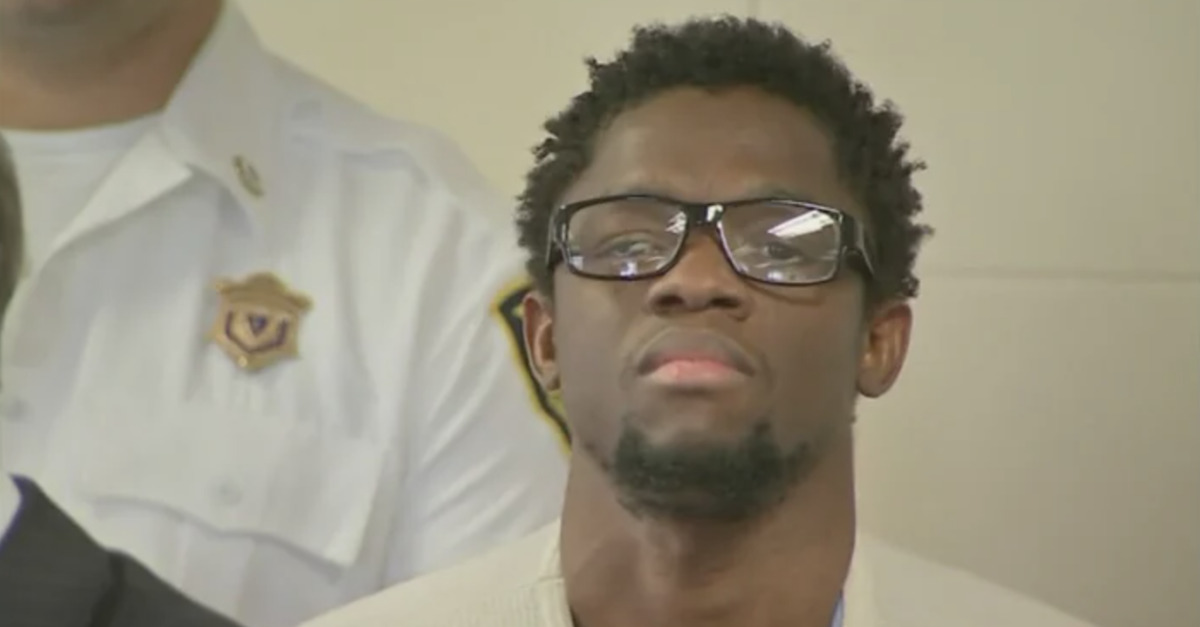
The highest court in the state of Massachusetts on Thursday morning upheld the murder convictions and sentence of a man who killed two doctors in their South Boston condominium in 2017.
Bampumim S. Teixeira, 36, worked as a concierge for about three weeks at Macallen Building in 2016. Prosecutors argued he used his knowledge gathered from that brief to stint to successfully bypass security measures when he brutally stabbed two anesthesiologists, 38-year-old Dr. Lina Bolaños and her fiancé, 49-year-old Dr. Richard Field to death in May 2017.
In December 2019, he was convicted of two counts of murder in the first degree by Suffolk County jurors on theories of deliberate premeditation, extreme atrocity or cruelty, and felony-murder.
#BREAKING: Bampumin Teixera found GUILTY of the murders of Dr. Lina Bolanos and her fiance Dr. Richard Field in their #SouthBoston penthouse. #WBZ pic.twitter.com/WEJrY0ZDh9
— David Wade (@davidwade) December 10, 2019
The defendant’s aggressive and rude antics saw him twice forcibly removed from the courtroom during the final days of his trial.
The day after Suffolk County Assistant District Attorney John Pappas delivered the state’s closing argument, Teixeira asked his defense attorney: “Did you hear what he said yesterday?”
“Hey Pappas,” the defendant shouted out – while motioning toward the prosecutor, according to The Boston Globe. “You better hope I never get out of jail. Your wife is getting fucked.”
Later that same day, the jury was prepared to deliver their verdict and have the defendant hear his fate. That didn’t go according to plan.
“Want to know his last words?” Teixeira yelled toward several crying relatives of his victims – including Field’s mother. “He say, ‘No.'”
A court officer had the defendant removed again and, when the jury had finally reached their verdict after some eight hours of deliberation, Suffolk Superior Court Judge Mitchell Kaplan said Teixeira had forfeited his right to hear the outcome since “he was unable to control himself.”
Teixeira has maintained his innocence throughout the proceedings.
The Bay State’s top court summed up his defense:
He contended that he and Bolanos were having an affair, that the victims’ engagement was a sham with Bolanos remaining in the relationship solely for financial reasons, that Field killed Bolanos, and that the defendant killed Field in self-defense.
The state ridiculed the defense’s theory of the case.
“It was not enough for him to murder them in their own home,’” Pappas told jurors of the defendant. “Not enough for him to destroy their lives. … He had to destroy their names as well.”
Jurors ultimately rejected the defense narrative and Teixeira was later sentenced to two consecutive sentences of life without the possibility of parole for the murders as well as a variety of consecutive and concurrent sentences for home invasion, armed robbery, and kidnapping.
On appeal, the defendant argued the state improperly appealed to the jury’s sympathy and emotions during closing arguments.
Pappas said the victims are “[n]ow engaged for eternity” and that “Lina will forever be Richard’s fiancée but never his bride.”
The court noted that appeals to sympathy are generally not allowed but said that the state’s invocation here was permissible – because Teixeira himself had opened the door to that particular subject matter.
“The defense was grounded on the theory that the engagement was a sham,” the opinion by Justice Dalila A. Wendlandt reads. “In these circumstances, the statement to which the defendant now objects was a permissible — if hyperbolic — response to the defense.”
The opinion also goes into detail about a more fact-based dispute about the precise nature of the slain couple’s relationship:
Significantly, in closing argument, defense counsel contended that any inconsistencies in the defendant’s statement to police in the aftermath of the killings were the result of his injuries and the pain medications he had been prescribed following his surgery. Responding, the prosecutor referred to the evidence of the writing on the victims’ residence’s walls that “He killed my wife,” which inferably was written by the defendant at a time when the defendant was not injured or under the influence of pain medication. The challenged statement contrasted the couple’s engagement and Bolanos’s status as Field’s fiancée with the statement written by the defendant on the penthouse wall, referring inferably to Bolanos as the defendant’s “wife.” Thus, the prosecutor’s statement, which was made once at the beginning of the closing argument, immediately following the defendant’s closing, was not improper and was responsive to the defense.
Texeira also raised two procedurally-based appeals but the high court said those arguments wouldn’t have made a difference or were not accurately based on state precedent in criminal cases.
“After review of the entire record, we discern no error warranting relief,” the court ruled.
[image via screengrab/WBZ-TV]